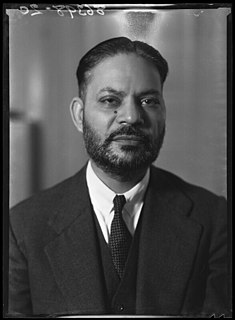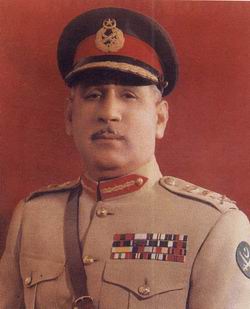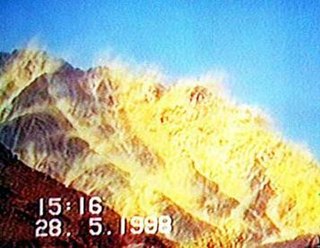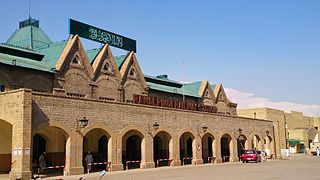
East Pakistan was the eastern provincial wing of Pakistan between 1955 and 1971, covering the territory of the modern country Bangladesh. Its land borders were with India and Myanmar, with a coastline on the Bay of Bengal.

Agha Muhammad Yahya Khan, widely known as Yahya Khan, NePl, was the third President of Pakistan, serving in this post from 25 March 1969 until turning over his presidency in December 1971.

Mohammad Ayub Khan, HPk, NPk, HJ, MBE military dictator and the second President of Pakistan who forcibly assumed the presidency from the first President Iskander Mirza through coup in 1958, the first successful coup d'état of the country. The popular demonstrations and labour strikes which were supported by the protests in East Pakistan ultimately led to his forced resignation in 1969.

Zulfikar Ali Bhutto was a Pakistani politician who served as the 9th Prime Minister of Pakistan from 1973 to 1977, and prior to that as the 4th President of Pakistan from 1971 to 1973. He was also the founder of the Pakistan People's Party (PPP) and served as its chairman until his execution in 1979.

Imran Ahmed Khan Niazi is a Pakistani politician and former international cricketer who is the 22nd and incumbent Prime Minister of Pakistan. He is also the founder of the Pakistan Tehreek-e-Insaf (PTI). Previously, he was a member of the National Assembly of Pakistan from 2002 to 2007, and again from 2013 to 2018.
Abdul Qadeer Khan, NI, HI, FPAS, known as A. Q. Khan, is a Pakistani nuclear physicist and a metallurgical engineer, who founded the uranium enrichment program for Pakistan's atomic bomb project. AQ Khan founded and established the Kahuta Research Laboratories (KRL) in 1976, serving as both its senior scientist and Chairman until he retired in 2001. Khan was also a figure in other Pakistani national science projects, making research contributions to molecular morphology, the physics of martensite alloys, condensed matter physics, and materials physics.

Ghulam Ishaq Khan, was a Pakistani bureaucrat who served as the 7th President of Pakistan, elected in 1988 until his resignation in 1993.

Nawabzada Liaquat Ali Khan, widely known as Quaid-e-Millat and Shaheed-e-Millat, was one of the leading founding fathers of Pakistan, statesman, lawyer, and political theorist who became and served as the first Prime Minister of Pakistan; in addition, he also held cabinet portfolio as the first foreign, defence, and the frontier regions minister from 1947 until his assassination in 1951. Prior to his assassination, Khan briefly tenured as the first finance minister in the interim government led by its Governor General Mountbatten.

Chaudhry Muhammad Zafarullah Khan was a Pakistani jurist and diplomat who served as the first Foreign Minister of Pakistan. After serving as foreign minister he continued his international career and was the first Asian and the only Pakistani to preside over the International Court of Justice. He also served as the President of the UN General Assembly. He is the only person till date to serve as the President of both UN General Assembly and the International Court of Justice.

General Tikka Khan, (February 1915 – 28 March 2002) HJ, S.Pk, was a four-star rank army general in the Pakistan Army who served as the first chief of army staff from 3 March 1972 till retiring on 1 March 1976.

Pakistan Tehreek-e-Insaf (PTI) is a centrist political party in Pakistan founded in 1996 by former international cricket captain and current Prime Minister of Pakistan Imran Khan. As a result of the 2018 general election, PTI is the governing party of Pakistan as the largest party in the National Assembly in the ruling coalition.

The Awami National Party is a secular and leftist Pashtun nationalist political party in Pakistan. The party was founded by Abdul Wali Khan in 1986 and its current president is Asfandyar Wali Khan, grandson of Bacha Khan, with Mian Iftikhar Hussain serving as the Secretary-General. Part of the PPP-led cabinet of the Pakistani government during 2008−13, the ANP's political position is considered left wing, advocating for secularism, democratic socialism, public sector government, and economic egalitarianism.

Chakwal is the capital and main city of Chakwal District, Punjab, Pakistan. It is located 90 kilometres south-east of the federal capital, Islamabad and 270 kilometres from the provincial capital, Lahore.

Chagai-I is the code name of five simultaneous underground nuclear tests conducted by Pakistan at 15:15 hrs PST on 28 May 1998. The tests were performed at Ras Koh Hills in the Chagai District of Balochistan Province.

The Directorate for Military Intelligence, known as "Military Intelligence" (MI), is the intelligence arm of the Pakistan Army. It is headquartered at the General Headquarters in Rawalpindi, Pakistan.

Chhachh or Chach is a region consisting of an alluvial plain extending from Attock District of Punjab, Pakistan, southwest of Topi and Swabi.
Shahryar Mohammad Khan is a former career Pakistan diplomat who became Foreign Secretary of Pakistan in 1990, and remained so until his retirement from service in 1994. He later served as UN SRSG to Rwanda (1994–1996). Since August 1999, he has intermittently served as the chairman of Pakistan Cricket Board. He is the current president of Asian Cricket Council.

Project-706, also known as Project-726 was a codename of a project to develop Pakistan's first atomic bomb using uranium. At the same time, Pakistani nuclear technology scientists and engineers gained expertise in the use of reactor-grade plutonium and successfully produced weapons grade plutonium by the early 1980s.

Malakhra or Malakhro is an ancient Sindhi form of wrestling in Pakistan and India, which dates back 5000 years. The match begins with both wrestlers tying a twisted cloth around the opponent's waist. Each one then holds onto the opponent's waist cloth and tries to throw him to the ground. Malakhra is one of the favorite sports among males in Sindh, Pakistan and Gujarat, India. Malakhara matches are generally held on holidays and Fridays and are a feature of all fairs and festivals. Rich feudal lords and influential persons maintain famous Malhoo (wrestlers) and organize matches for them. In the Pakistani region of Sindh, it is the provincial sport.





















